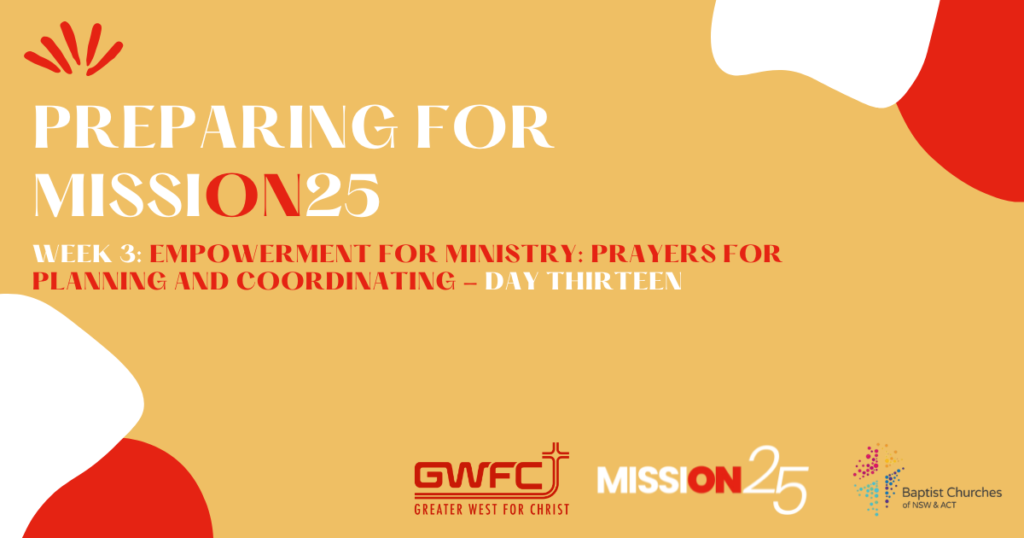Day 13 (Wednesday): Acts 1:1-8
Today’s Passage
Read the passage – Acts 1:1-8
We should never fear what God wants to do with us. After all, he is totally love. So, when Jesus told his disciples to wait for power from on high, that is for the Holy Spirit to come in power, he did so knowing that the Spirit would empower his people for what he calls us to do and to be. True Christian ministry comes not from human effort but from the Spirit of God witnessing and acting through us as we trust God. How important is it then that we wait on God in prayer for empowerment?
Questions to Consider
- When you look at this passage, what stands out to you?
- What does it mean for us to wait on God for His Spirit to empower us?
Prayer
- Help us to stay focused on Your mission and not get distracted by details.
- Take some time to wait on God for the Holy Spirit to empower you for the ministry he has for you. Confess anything you may have done (perhaps out of fear) to stop his work. Ask that God would bless other churches in our local area with the power of the Spirit.
Go Deeper
In Acts 1:8, Jesus promises that they will receive “power” when the Spirit comes. What does Luke mean by power? Although not all references involve healing and exorcism, these constitute the most common expressions of that power in Luke’s narrative. Thus, Jesus casts out demons with power in Luke 4:36; power was present for healing in Luke 5:17; power was coming from Jesus to heal in Luke 6:19; power came from Jesus to heal in Luke 8:46; and Jesus gave the Twelve power over demons in Luke 9:1.
Likewise, in Acts 3:12, Peter insists that it is not by their own “power” or holiness that the man was healed, but by Jesus’s name. The authorities demand in Acts 4:7, “By what power, or in what name,” the man was healed, inviting the same emphasis. In Acts 6:8, Stephen, “full of grace and power,” was doing wonders and signs. In Acts 10:38, Peter declares that Jesus healed all who were oppressed by the devil because he was anointed with the Spirit and power.
We should note how closely Luke’s account connects this empowerment with the Spirit. The Hebrew Scriptures often associated the Spirit with prophetic empowerment, among other activities. By the era of the early church, early Jewish sources generally focus on this activity even more specifically, as a number of scholars, most extensively Robert Menzies, have shown. Because the Spirit was so closely associated with prophecy and the kinds of activities undertaken by prophets, Jesus was promising the disciples that the same Spirit who spoke through the prophets would speak through them.
If we are too accustomed to that notion to catch its full force, we might imagine Jesus speaking to us and saying, “You will be like Isaiah,” or “You will be like Jeremiah,” or “You will be like Deborah.”
Because Luke has already noted that Jesus’s commission is grounded in Scripture (Luke 24:44–46), he invites us to hear echoes of Scripture in Jesus’s words here. The promise that the Spirit would empower them as “witnesses to … the ends of the earth” reflects the language of Isaiah. Isaiah spoke of Israel or its remnant being “witnesses” for YHWH (Isa 43:10; 44:8), a role here applied to witnesses for Jesus.
Isaiah spoke of God empowering his people through his Spirit in that time (e.g., Isa 32:15; 44:3), including to speak for him (Isa 42:1; 48:16; 59:21; 61:1). The “ends of the earth” also echoes Isaiah, especially Isa 49:6, later quoted in Acts 13:47.
Craig S. Keener, Between History and Spirit: The Apostolic Witness of the Book of Acts (Eugene, OR: Cascade Books, 2020), 224–225.
Songs for Worship and Reflection


